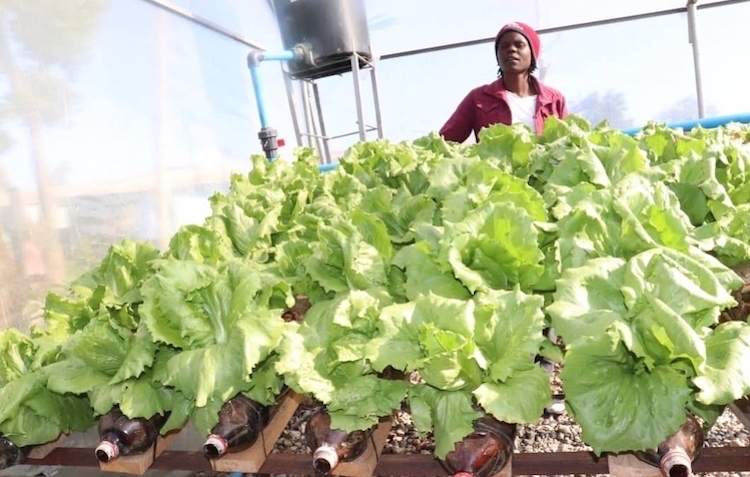By Farai Shawn Matiashe
MUTARE, Zimbabwe (IDN) — Ruth Rugeje, 38, monitors plants of cabbages, a pale green leafy vegetable, grown in empty two-litre bottles in the backyard of her home in Mutapa, a high-density suburb in the central Zimbabwean city of Gweru.
This innovative farmer picked these plastic bottles from the illegal dumping sites in her neighbourhood and reused them in hydroponics.
There is a greenhouse to help control temperatures in her garden.
Her system of hydroponics uses gravity to pump water and nutrients through pipes to plants in plastic bottles as opposed to the one powered by a solar system or electricity from the national grid.
In a country facing long-hour power load shedding due to old generators at the main power plants in Kariba and Hwange, solar energy has become the alternative for many, particularly farmers with hydroponics stations as the system require electricity for 24 hours.
But the costs to install solar power are beyond the reach of many like Rugeje.
The use of gravity in hydroponics is viable and reduces costs.
“I was receiving cash-based transfers as a cushioning to Covid-19 shocks. I already had a small garden. I was later supported to venture into hydroponics in October last year,” says Rugeje, a single mother to an 11-year-old daughter.
“I picked up empty bottles from the dumping sites near my home and started growing leafy vegetables, including lettuce, spinach and cabbages.”
She says picking up empty bottles reduces her operating costs.
“I did not buy them. I saved a lot. These bottles are also easy to replace,” Rugejo says.
Illegal dumping sites have become common in Gweru and other parts of the country, with the reckless disposal of plastics causing a major headache.
This is because there is inconsistency in garbage collection by the City of Gweru authorities, particularly in high and medium-density suburbs.
Rubbish dumping in Gweru attracts a fine, forcing some people to dispose of garbage late at night or early in the morning.
Yet plastics are a health hazard to humans, particularly when burnt.
Some of the plastics that take hundreds of years to decompose find their way into rivers and dams in the cities in Zimbabwe.
Research shows that plastics break down into more methane and ethylene, which are greenhouse gasses that worsen climate change.

< Lettuce grown in plastic bottles in Ruth Rugejo’s backyard garden in Gweru. Credit: Kudzai Mpangi.
Rugejo is one of the many households in Gweru that are being supported with livelihoods programmes, including hydroponics, by a German charity, Welthungerhilfe.
When she ventured into hydroponics late last year, she thought the vegetables would be for family consumption.
Little did she know that she would end up selling some to her neighbours.
“I sold excess after I harvested for the first time early this year,” says Rugejo, an unemployed woman who survives on farming.
“The money helped me pay school fees for my daughter and other essentials like clothes.”
Takudzwa Muvindi, a productive assets creation engineer with Welthungerhilfe under the Urban Resilience Building Programme, says the hydroponics system that uses recycled plastic bottles is cost-effective.
“Nutrients are added into the water in a 65 litres container. Both are transported to the plants grown in plastic bottled via pipes using gravity,” says Muvindi, who designed this hydroponic system.
“At the end of the process, there is a container that collects water. The farmer pours it back into the main 65 litres tank. She can do this three times a day depending on the weather conditions.”
Hydroponics, a soilless cultivation technique that enables plant growth in arid or peri-urban areas, uses up to 90 per cent less water and 75 per cent less space.
Vegetables that are grown in a hydroponics technique grow at a rate of 100 per cent faster than traditional farming.
Hydroponics is an option for farmers with limited access to land and water and works well in places with poor soils, says Louis Muhigirwa, a deputy Food and Agriculture Organisation representative in Zimbabwe.
“It is a potentially useful tool to overcome some of the challenges of traditional agriculture in the face of freshwater shortages, climate change and soil degradation in areas such as urban, arid climates and low-lying islands,” he says.
Rugejo dreams of owning a farm and practising hydroponics farming on a commercial basis.
“If given a large piece of land, I would be happy to supply vegetables to supermarkets in the city,” she says. [IDN-InDepthNews – 07 October 2022]
Photo: Zimbabwean farmer Ruth Rugejo runs a hydroponics system that uses recycled plastic bottles at her home in Gweru. Credit: Kudzai Mpangi.
IDN is the flagship agency of the Non-profit International Press Syndicate.
This article was produced as a part of the joint media project between The Non-profit International Press Syndicate Group and Soka Gakkai International in Consultative Status with ECOSOC on 07 October 2022.
We believe in the free flow of information. Republish our articles for free, online or in print, under Creative Commons Attribution 4.0 International, except for articles that are republished with permission.

